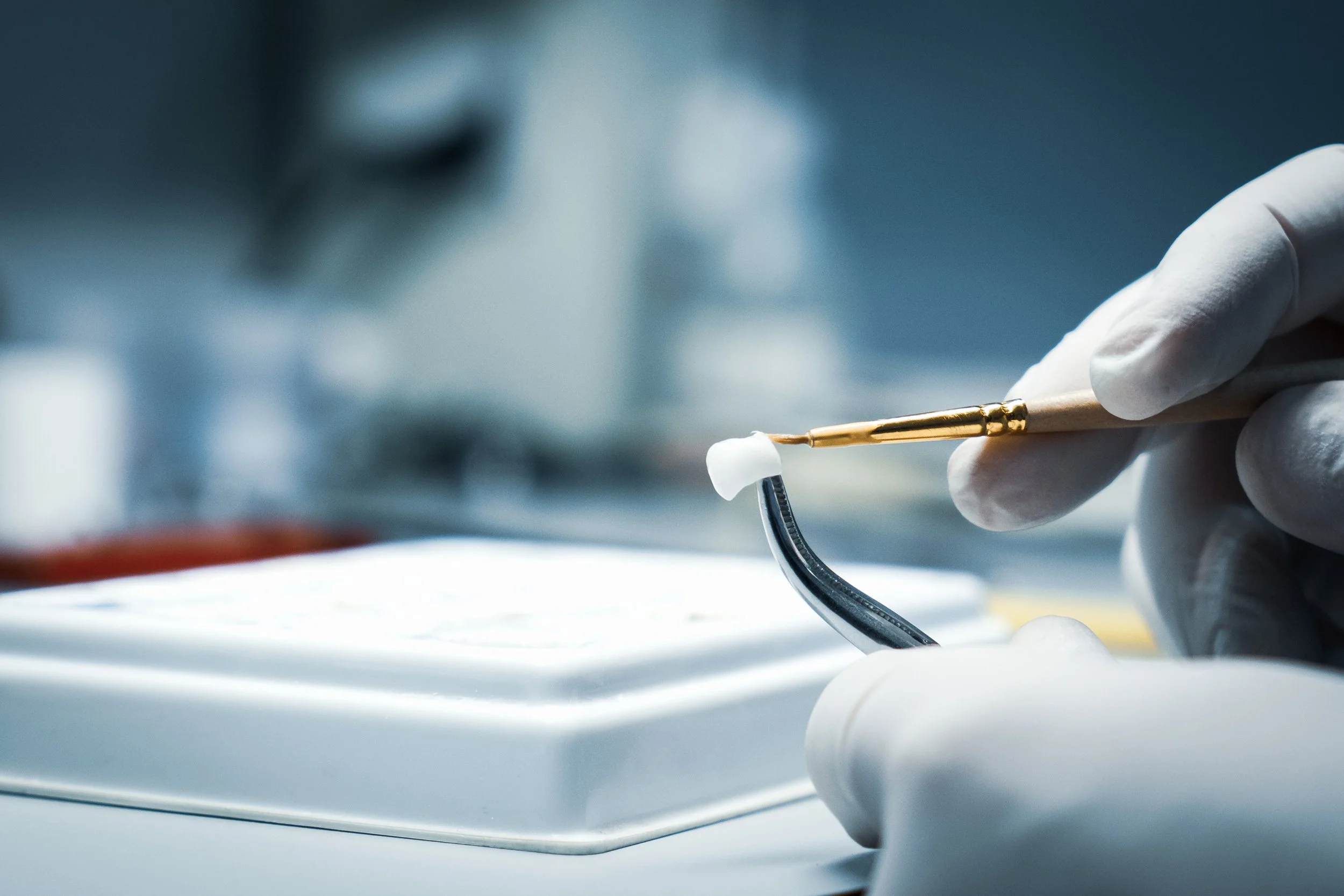How Much Do Crowns Cost: The Complete Guide to Dental Crown Pricing
Please note: Dental treatment costs can vary significantly based on geographic location, individual needs, and specific dental practices. The pricing information in this article represents typical or standard costs to help you understand general expectations for crown treatment.
Key Takeaways
Price Range: Dental crowns typically cost $1500-$3000 per tooth, depending on materials and complexity
Long-term Value: A quality crown should last 15-20 years, making the annual cost approximately $80-$300
Insurance Coverage: Most plans cover 50% of crown expenses after deductibles, up to annual maximums
Material Matters: Your choice of crown material significantly impacts both expense and longevity
You're sitting in the dental chair, and your dentist explains that you'll need a crown. While this news might initially feel overwhelming, understanding the investment involved can help you make an informed decision about this important dental treatment.
If you've found yourself researching crown pricing online, you're taking the right step toward understanding your options. This treatment pricing can seem complex at first, with costs varying based on several important factors that we'll explore together.
Let's walk through everything you need to know about crown pricing, so you can approach this treatment with confidence and clarity.
Why You Might Need a Crown in the First Place
Before we discuss the financial aspects, let's talk about why your tooth might need this treatment. Understanding the reasons behind crown recommendations can help put the cost into perspective—after all, you're receiving a protective covering for your tooth.
Large Fillings That Need Reinforcement: When a filling takes up more than half of your tooth, the remaining tooth structure becomes too weak to support the filling reliably. Eventually, further problems become likely. A crown offers the strength and protection needed for years of proper function.
Cracked or Fractured Teeth: Whether it happened while biting down on a hard object or during an accident, cracked teeth need immediate attention. A crown acts like protective armor, holding all the pieces together and preventing the crack from spreading deeper.
After Root Canal Treatment: Once you've had a root canal, your tooth becomes more brittle since the nerve and blood supply have been removed. Consider a tree that's been hollowed out—it requires extra support to withstand chewing forces. Crowns restore full function while offering crucial protection.
Severe Tooth Decay: When decay has caused significant damage, there might not be enough healthy structure left to support a regular filling. Crowns can restore shape, size, and strength when other options aren't sufficient.
Cosmetic Reasons: Sometimes teeth are structurally sound but aesthetically compromised. Severe discoloration that doesn't respond to whitening, misshapen teeth, or teeth with large gaps can all benefit from crowns, providing a complete smile transformation.
To Anchor a Dental Bridge: If you're missing a tooth and getting a bridge, the adjacent teeth require crowns to support the replacement tooth. They're serving dual purposes, so they need the extra strength.
Excessive Wear: Some people are hard on their teeth—whether from grinding, clenching, or just aggressive chewing habits. Over time, this can wear teeth down significantly. Crowns can restore proper height and function.
Simply put, if your dentist is recommending a crown, it's because your tooth needs more protection than a filling can provide. This recommendation represents the most effective way to save your tooth and prevent more extensive problems down the road.
Understanding Crown Pricing
Dental crowns typically range from $1500-$3000 per tooth. This range reflects the various materials, techniques, and individual needs that influence treatment.
On the more affordable end, you'll find crowns made from materials like metal alloys or resin, typically ranging $800 to $1,200. Mid-range options—such as porcelain-fused-to-metal crowns—usually fall between $1,200 to $1,800. Premium options, including all-ceramic or all-porcelain crowns, generally range between $1,500 to $3,000, with some specialized materials requiring a higher investment.
It's important to view a crown as a long-term investment in your oral health. A well-crafted crown should serve you faithfully for 10-15 years with proper care. When you break this down annually, you're looking at approximately $80 to $300 per year to maintain your tooth's function and your smile's integrity.
What Actually Influences Crown Pricing
Crown pricing varies based on several important factors that directly impact both the treatment process and long-term results.
Geographic Location: A crown in a major metropolitan area will cost significantly more than the same procedure in a smaller city or rural area. This reflects differences in operating costs, including rent, labor, and overhead expenses that vary dramatically across different regions.
Material Selection: The material you choose directly impacts both the cost and longevity of your treatment. Different materials offer various benefits in terms of durability, aesthetics, and function.
Complexity of Your Case: Some teeth require straightforward treatment, while others need additional procedures, custom work, or multiple appointments. If your tooth needs a root canal, extensive buildup, or other preparatory work before placement, this will affect the overall cost.
Your Dentist's Experience and Training: Dental expertise and specialized training in restorative or cosmetic dentistry may command higher fees, but you're receiving years of additional education and experience.
Laboratory Fees: Your crown is custom-made in a dental laboratory by skilled technicians. High-end labs that use advanced technology and premium materials charge more for their services, and these costs are reflected in your treatment pricing.
What to Expect During the Crown Process
Understanding the crown placement process can help you feel more prepared and comfortable with your treatment investment.
Initial Consultation and Treatment Planning: Your dentist will examine your tooth, possibly take X-rays, and discuss your treatment options. This is the perfect time to ask questions about materials, costs, and what to expect.
First Appointment - Tooth Preparation: During this visit, your dentist will prepare your tooth by removing any decay and shaping it to accommodate the crown. They'll take detailed impressions of your teeth and place a temporary crown to protect your tooth while the permanent crown is being made.
Laboratory Creation Process: Your impressions are sent to a dental laboratory where skilled technicians create your custom crown. This process typically takes 1-2 weeks, during which you'll wear your temporary crown.
Second Appointment - Crown Placement: Once your permanent crown is ready, you'll return to have it fitted and permanently cemented in place. Your dentist will check the fit, bite, and appearance before final placement.
Same-Day Crown Option: Some dental practices offer same-day crowns using CAD/CAM technology. While convenient, these may cost slightly more ($200-$500 additional) but eliminate the need for a temporary crown and second appointment.
Crown Options and Their Price Points
Here are your crown options with their respective price ranges and what you receive for your investment.
Metal Crowns ($800-$1,400): These are the most durable option available. Made from gold, platinum, or base-metal alloys, they're incredibly long-lasting and require minimal tooth removal. They're typically used for back molars where appearance isn't a primary concern, but durability is essential.
Porcelain-Fused-to-Metal (PFM) Crowns ($1,000-$1,800): These combine metal strength with porcelain aesthetics. They have a metal base for durability with a porcelain overlay for natural appearance. They offer excellent balance of function and aesthetics, though the metal base may sometimes show through as a dark line at the gum line over time.
All-Ceramic or All-Porcelain Crowns ($1,200-$2,500): These provide the most natural-looking results and are an excellent choice for front teeth or anyone with metal allergies. Modern ceramics offer improved strength while maintaining beautiful aesthetics.
Zirconia Crowns ($1,500-$3,000): This advanced material combines exceptional durability with excellent appearance. Zirconia is biocompatible, extremely strong, and can be precisely matched to your natural teeth. Many dental professionals consider this the premium standard of modern technology.
Resin Crowns ($800-$1,200): These are typically temporary solutions or budget options. They're less expensive initially but don't last as long as other materials and are more prone to wear and staining.
Insurance Coverage Reality
Understanding how dental insurance works with crown treatment can help you plan your expenses more effectively.
Most dental insurance plans classify crowns as "major restorative" procedures, which typically means they'll cover 50% of the expense after you've met your deductible. However, they'll only cover up to their "reasonable and customary" fee for your area, which may be lower than your dentist's actual fees.
For example, if your dentist charges $2,000 for a crown but your insurance company's approved fee is $1,200, they'll pay 50% of $1,200 ($600), leaving you responsible for $1,400.
Annual Maximums: Most dental plans have annual maximums between $1,000-$2,000, representing the total amount they'll pay for all dental work in a year. One crown could potentially reach your maximum, affecting coverage for additional dental work needed that year.
Maximizing Your Benefits: Many dental practices offer guidance on timing treatments to maximize insurance benefits. Some patients schedule crown work early in the year to take full advantage of their annual maximum, or spread multiple crowns across benefit years.
Alternative Coverage Options: If you don't have dental insurance, many practices offer membership plans or discount programs that can provide savings on crown treatment.
At Kirkwood Family Dental, we believe a stunning smile can be truly life-changing. See more before and after photos using dental crowns and other applications of cosmetic dentistry. Contact us today to learn how we can help you experience a transformation firsthand.
Additional Investment Considerations
Understanding the complete scope of your crown treatment investment helps avoid surprises.
Pre-Crown Procedures: Your tooth might need preparatory work before crown placement. Root canals can add $800-$1,500 to your treatment expense. Core buildups to restore tooth structure can add another $200-$400.
Temporary Crown: While your permanent crown is being created, you'll need a temporary crown to protect your prepared tooth. This usually runs an additional $100-$300, though some dentists include it in their crown fee.
Multiple Appointments: Most traditional crowns require at least two appointments. If complications arise or adjustments are needed, you might require additional visits.
Sedation Options: If you prefer sedation during your procedure, nitrous oxide can add $50-$100 per appointment, while oral sedation might cost $200-$400. IV sedation can range from $400-$600 or more.
Adjustments and Follow-ups: While minor adjustments are often included in the initial fee, extensive modifications might incur additional charges.
Financing and Payment Options
Most dental practices understand that crown treatment represents a significant investment and offer various payment solutions.
In-House Payment Plans: Many practices offer flexible payment arrangements that allow you to spread the cost over several months without interest.
Third-Party Financing: Companies like CareCredit, Lending Club, and others specialize in healthcare financing, often offering promotional periods with no interest if paid within a specific timeframe.
Health Savings Accounts (HSAs) and Flexible Spending Accounts (FSAs): These pre-tax dollars can significantly reduce the real cost of your dental work. A $2,000 crown might only cost you $1,400 in after-tax dollars if you're in the 30% tax bracket and use HSA funds.
Dental Membership Plans: Some practices offer annual membership plans that provide discounts on major procedures like crowns for patients without insurance.
Prompt Payment Discounts: Some dental offices offer discounts for paying the full amount at the time of service.
Smart Budgeting for Your Crown
This treatment isn't usually a planned expense, but with thoughtful planning, you can handle the financial aspect effectively.
Start with a Comprehensive Treatment Plan: Ask your dentist for a complete evaluation and treatment plan. It's better to know if you'll need multiple crowns over the next few years so you can plan accordingly.
Explore Payment Options: Most dental practices offer flexible payment plans, third-party financing through companies like CareCredit, or simple payment splitting arrangements.
Consider Timing Strategically: If you have dental insurance, timing your treatment strategically can maximize your benefits. Getting your procedure early in the year gives you the full benefit of your annual maximum.
Get Multiple Opinions: This ensures you're getting appropriate treatment. Sometimes what one dentist diagnoses as needing a crown might be treatable with a less expensive filling by another dentist.
When to Invest in Premium vs. Budget Options
Consider Premium Options When: You're treating front teeth that are visible when you smile. You're young and expect this crown to last for decades. You have a heavy bite or grind your teeth.
Budget Options Might Work When: The crown is on a back molar that's not visible. You're older and the crown likely won't need replacement in your lifetime. You have multiple crowns needed and want to spread the investment.
The Middle Ground: For many people, zirconia/ceramic crowns offer a balance between beautiful aesthetics, strength and longevity.
Finding the right dental practice can make all the difference in both your experience and the value you receive. Practices like Kirkwood Family Dental, with their 30-year commitment to comprehensive family care, understand that dental treatment is an investment in your health and happiness.
Ready to Transform Your Smile?
At Kirkwood Family Dental, we love restoring smiles. Learn more about how we address cosmetic concerns using porcelain veneers by contacting our office today. We can’t wait to meet you!
Questions to Ask Your Dentist
Being prepared with the right questions helps you make informed decisions:
About the Treatment: Why do you recommend a crown instead of other treatments? What type of crown material do you recommend for my situation? How long will the crown last?
About Costs: What is the total investment for my crown treatment? Are there additional costs I should expect? What payment options do you offer?
About Aftercare: How do I care for my crown? What foods should I avoid? What signs should prompt me to call your office?
Crown Care and Maintenance
Proper care maximizes your crown investment and ensures the longest possible lifespan.
Daily Care: Care for your restoration exactly like your natural teeth. Brush twice daily with fluoride toothpaste and floss daily, paying special attention to the gum line.
What to Avoid: Avoid chewing ice, hard candy, or using your teeth as tools. Be cautious with sticky foods that could pull your restoration loose. If you grind your teeth, discuss a night guard with your dentist.
Professional Care: Maintain regular dental visits for cleanings and checkups. Your dentist can monitor your restoration and address any issues early.
The Long-Term Investment Perspective
When considering a crown investment, it's important to view this as a long-term health decision. A well-made crown should last 10-15 years with proper care, and many last even longer. This compares favorably to other investments you make regularly.
Beyond the financial considerations, delaying necessary crown treatment can lead to more complex and expensive problems. What starts as a crown-level problem can escalate to needing root canal therapy and a crown, or even tooth extraction and implant replacement.
The confidence that comes from having a fully functional, attractive smile is an important factor in your overall well-being. You're not just purchasing a crown—you're investing in years of comfortable chewing, confident smiling, and peace of mind.
Frequently Asked Questions
How long do crowns typically last? Most crowns last 10-15 years with proper care, though many can last 20+ years. The lifespan depends on the material used, your oral hygiene, and eating habits.
Does getting a crown hurt? The procedure is performed under local anesthesia, so you shouldn't feel pain during treatment. Some mild discomfort is normal for a few days after placement.
Can I eat normally with a crown? Yes, once your permanent crown is placed and any initial sensitivity subsides, you can eat normally. Avoid extremely hard foods that could damage any tooth.
Will my crown look natural? Modern crowns, especially ceramic and porcelain options, are designed to match your natural teeth in color, shape, and translucency.
What if my crown falls off? While uncommon, crowns can occasionally come loose. Contact your dentist immediately if this happens. Don't try to cement it back yourself.
Can I whiten a crown? Crowns don't respond to whitening treatments. If you're considering teeth whitening, do it before getting your crown so it can be matched to your desired shade.
How do I care for my crown? Care for a crown just like your natural teeth—brush twice daily, floss regularly, and see your dentist for regular checkups. Avoid chewing ice or using your teeth as tools.
Is sensitivity normal after crown placement? Some sensitivity to hot or cold is normal for a few days after placement. Severe or persistent sensitivity should be reported to your dentist.
Disclaimer
This article is for informational purposes only and should not be considered medical or dental advice. The costs, procedures, and information discussed may vary based on individual circumstances, geographic location, and specific dental practices. Always consult with a qualified dental professional for personalized advice regarding your specific dental needs and treatment options.
Dental treatment costs can vary significantly based on numerous factors including but not limited to: geographic location, complexity of treatment, materials used, individual patient needs, and insurance coverage. The price ranges provided are estimates based on general market information and should not be considered guaranteed pricing.
Individual results may vary, and the longevity of dental work depends on many factors including oral hygiene, lifestyle habits, and regular dental care. This information does not replace professional dental consultation, examination, or diagnosis. If you have dental concerns or need treatment, please contact a qualified dental professional in your area.





